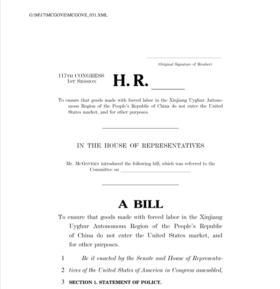WUC Joins Coalition to End Forced Labour to Welcome the Passage of the UFLPA

Update: on December 23rd, U.S. President Joe Biden signed the Uyghur Forced Labor Prevention Act into law.
News Release – For Immediate Release
16 December, 2021
Contact: World Uyghur Congress www.uyghurcongress.org
0049 (0) 89 5432 1999 or [email protected]
 Washington, D.C. — On the passage of the Uyghur Forced Labor Prevention Act, the Coalition to End Forced Labour in the Uyghur Region released the following statement:
Washington, D.C. — On the passage of the Uyghur Forced Labor Prevention Act, the Coalition to End Forced Labour in the Uyghur Region released the following statement:
We applaud the House and Senate for passing the Uyghur Forced Labor Prevention Act, despite opposition from many of the nation’s most powerful corporations.
By sharply constraining corporate complicity in forced labor, and putting real economic pressure on the Chinese government, this bill gives renewed hope to oppressed people across the Uyghur Region.
We hope President Biden will sign the bill swiftly and we call for its vigorous implementation and enforcement.
Responsible companies should take steps now, without waiting for the UFLPA to go into effect. The way to ensure compliance is to follow the supply-chain steps specified in the brand commitment created by the Coalition to End Forced Labour in the Uyghur Region. We urge fashion brands, solar companies, and other corporations to join Marks & Spencer, Reformation, and ASOS in publicly committing to these steps necessary to ensure there is no Uyghur forced labor in their supply chains.
The following are comments by leaders of Coalition member organizations:
“The passage of this legislation is a gigantic step forward in the fight to end forced labor in the Uyghur Region. And it is the most consequential piece of legislation Congress has passed in years to hold US corporations accountable for profiting from labor rights abuses abroad that I hope to see built upon,” said Joanna Ewart-James, Executive Director of Freedom United.
“The bill prevailed over the opposition of some of the most powerful corporations in the country. Its passage sends a message to corporate America: you will be held accountable for profiting from human rights abuses,” said Scott Nova, Executive Director of the Worker Rights Consortium.
“The swift and vigorous enforcement of the law will be critical. Specialists in forced labor prevention— some of whom are members of our Coalition—will be working to make sure CBP follows through. This will include active participation in the comment period and public hearing provided by the legislation on enforcement methods and, most importantly, assisting victim communities in participating in these processes,” said Omer Kanat, Executive Director of the Uyghur Human Rights Project.
“The bill, now headed to President Biden’s desk, significantly improves our ability to enforce the long-standing ban on the importation of forced-labor made goods into the United States. The bill is also an important step in leveling the playing field so the United States can establish a domestic solar supply chain, which is critical to success in the clean energy economy,” said Cathy Feingold, International Director of the AFL-CIO.
“The passage of this critical piece of legislation, combined with other significant actions in the European Union, shows that the world is waking up to the horrors unfolding in the Uyghur Region. People who think this bill is primarily about US-China relations are mistaken. It is about right and wrong, at the most fundamental human level,” said Rushan Abbas, Executive Director of Campaign for Uyghurs.
“Global corporations need to decide what side of history they want to be on. We urge companies to get ahead of enforcement and begin taking immediate steps to disengage from all business relationships in their supply chain that are in, or connected to, the Uyghur Region,” said Anita Dorett, Director of the Investor Alliance for Human Rights, an initiative of the Interfaith Center on Corporate Responsibility.
“For corporations incapable of recognizing moral imperatives, this legislation creates another powerful reason to get out of the Uyghur Region: the legal and financial risks in failing to do so will be enormous,” said Allison Gill, Forced Labor Program Director at Global Labor Justice-International Labor Rights Forum.
“The purpose of this bill is to ensure that corporations stop putting goods tainted with forced labor on store shelves in the United States. Full implementation takes place 180 days from the legislation’s enactment. For corporations that have been profiting from crimes against humanity in the Uyghur Region, the era of impunity is about to end,” said Amal Altareb, Executive Director at Free Uyghur Now.
“There’s no doubt that global corporations that oppose this bill will try to use the comment process to reduce the effectiveness of this bill,” said Misran Dolan, Director of Business Communications at the Uyghur American Association. “We will encourage wide participation by human rights advocates in the public comment process mandated by the law.”
“The Uyghur Forced Labor Prevention Act sets a clear precedent for the European Union and its Member States, who should follow suit and introduce, without further delay, an ambitious proposal for mandatory supply chain due diligence legislation supplemented by a mechanism that bans the imports of products made by forced labor,” said Dolkun Isa, President of the World Uyghur Congress.

